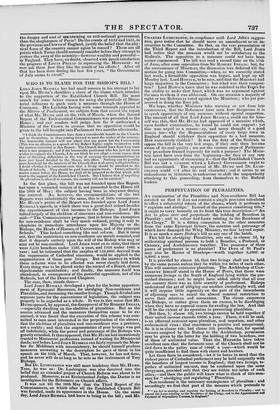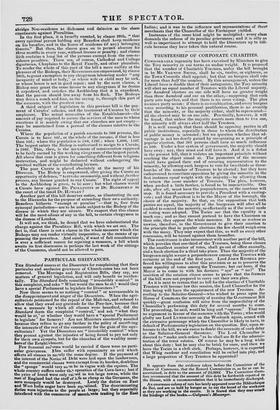PERPETUATION OF PLURALITIES.
AN examination" of the Pluralities and Non-residence Bill has satisfied us that it does not contain a single provision calculated to effect a substantial reform of the abuses, which it professes to " regulate and abridge." Instead of the present simulating title,* it ought to carry honestly on its front this true description—" An Act to gloss over and perpetuate the holding of Benefices in Plurality ; and to colour bad Laws relating to the Residence of the Clergy." It is a fitting companion to the other measures from the same Episcopal factory, the sanction and patronage of which have damaged the Whig Ministry, we fear beyond repair. It is as much a mere Bishop's bill as any one of the batch. This bill for abridging Pluralities, sets out, in clause 2d, by authorizing spiritual persons to hold a Benefice, a Prebend, or Canonry, and Archdeaconry together. The possessor of three pieces of preferment is no pluralist! The Dean of St Paul's may also be Rector of Stanhope—worth together 8,000L or 9,000/. a year. It is provided by clause 3d, that two livings shall not be held by the same person unless they lie within ten miles of each other. This will sanction extensive pluralism. The Archbishop of CAN- TERBURY himself stated in the House of Peers, that there were numerous livings in the South of England lying within the pre- scribed distance ; and be might have added safely that all over the country there was as little scarcity of preferment. Bishops understand the art of obliging one another exceedingly well, and it will require little ingenuity on the part of the incumbents of adjoining sees to annul the almost nominal restriction to serve their relatives and connexions. The clause empowers the Bishops, or rather gives them an excuse, to be disobliging when they have no especial reason for evading the law. And that will be the extent of its operation in preventing pluralities. But then, by clause 4th, two livings cannot be held together if their united income exceeds 1000/. a year. There, it will be said, is an effectual restraint upon pluralism, and nepotism, and other ecclesiastical vices : that enactment is positive and unequivocal. So it is in clause 4th; but clause 5th provides, that, for special reasons assigned by the Bishop to the Archbishop, permission may be given by the latter for the holding of two benefices, one of them of unlimited value. Thus the Hierarchs have taken excellent care that the fortunate sons of the Church shall not be tied down to the paltry sum of 1000/. a year—which would be quite insufficient to find them with claret and hunters. Let these facts be considered,—let it be borne in mind that the richest pieces of Cathedral preferment may be held conjointly with the benefices of largest income in England; that two livings, to- gether of unlimited amount, may be conferred upon the same clergyman, provided only that they are within ten miles of each other,—and then the public will know what to think of this mea- sure fur " abridging and regulating "Pluralities. Non-residence-is the necessary consequence of pluralism : and accordingly we find that part of the measure which pretends to • "An Act to abridge and regulate the bolding of Benefices in Plurality; and to amend the Laws relating to tire Residence of the Clergy, and to the Appointment and Payment of Stipendiary Curate., in England."
abridge Non-residence as dishonest and delusive as the sham enactments against Pluralities.
In the first place, it is broadly enacted, by clause 20th, " that every spiritual person holding any Benefice shall keep residence on his benefice, and in the house of residence (if any) belonging thereto." But then, the clause goes on to permit absence for three months in every year, without licence or penalty ; and clause 25th contains a long list of the persons exempt from the non-re- sidonce penalties. These are, of course, Cathedral and College dignitaries, Chaplains to the Royal Family, and other pluralists. To render the whole of this part of the bill a mere nullity at the pleasure of the Bishops, their Reverences are empowered, by clause 301h, to grant exemption to any clergyman labouring under "any incapacity of mind or body," or whose wife or child may be sick, or whose house is not in good repair; and by the next clause, a Bishop may grant the same favour to any clergyman if he deems it expedient, and satisfies the Archbishop that it is expedient, that the parson should live away from his flock. The Bishops may drive a coach and four, as the saying is, through this part of the measure, with the greatest case.
A third subject of legislation in this precious bill is the pay- ment of Curates' salaries, and the treatment of Curates by their employers. The actual necessities of the Establishment—the amount of pay required to secure the services of the men to whose exertions it is mainly owing that our churches are not empty— may be ascertained from a perusal of the clauses relative to the Curates.
Where the population of a parish amounts to 300 persons, the Curate is to have 801., or the whole of the income, it that is less than 801.; where the population is 500, 120/.; when 1,000, 150/. The largest salary the Bishop is authorized to assign to a Curate, is 2001. This, then, is the maximum of remuneration supposed to be fairly earned by the working clergymen of the largest parish. All above that sum is given for something different from religious instruction, and might be deducted without endangering the spiritual welfare of the contributing laymen.
The poor Curate is placed absolutely at the mercy of his Diocesan. The Bishop is empowered, after giving the Curate an opportunity of defence, "to revoke summarily, and without further process, any licence granted to any Curate.' flie right of appeal
i
to the Archbishop is given, to be sure ; but what chance would a Curate have against Dr. PHILLPOTTS or Dr. BLOMFIELD in the court of the timid Dr. HOWLEY ?
Another part of this bill deserves notice, as illustrating its use to the Hierarchs for the purpose of extending their own authority. Benefices hitherto "exempt or peculiar "— that is, free from episcopal jurisdiction—are to be made subject to the Bishop of the diocese in which they are situate. We suspect that this clause will be the most odious of any in the bill, to certain clergymen in the diocese of London.
It will not, we think, be denied that we have substantiated the charge against the Pluralities Bill, with which we set out. The fact is, that there is not a clause in the whole measure which the Bishops may not render virtually inoperative, or the means of op- pressing the powerless. And surely, if want of full consideration is ever a sufficient reason for rejecting a measure, a bill which awaits its first discussion in perhaps the last week of the sittings of the Commons, should not be allowed to pass.



























 Previous page
Previous page